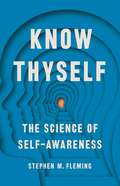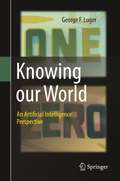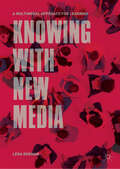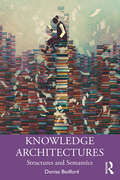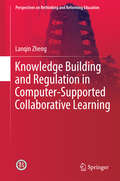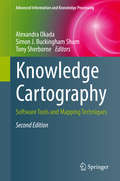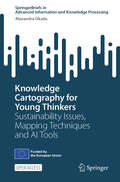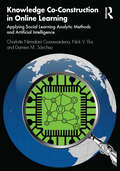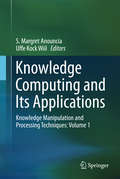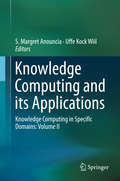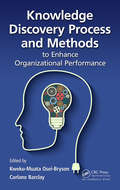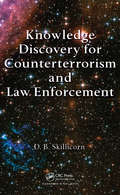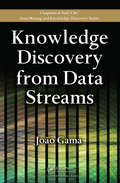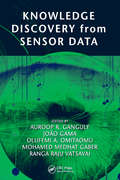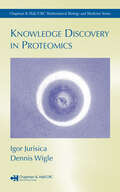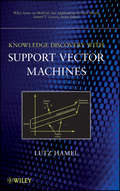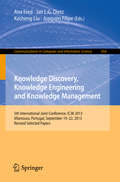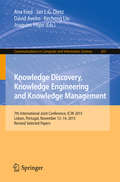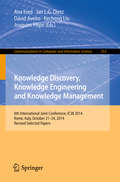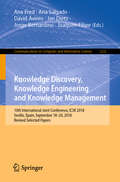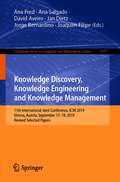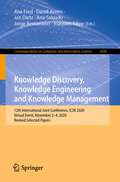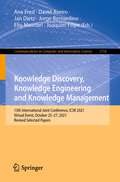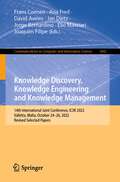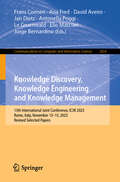- Table View
- List View
Know Thyself: The Science of Self-Awareness
by Stephen M FlemingUnlock the secrets to understanding yourself and others with the surprising science of the human mind's greatest power: introspection. &“Are you sure?&” Whether in a court room, a doctor&’s office, a gameshow&’s hot seat, or a student&’s desk, we are always trying to answer that question. Should we accept eyewitness testimony or a physician&’s diagnosis? Do we really want to risk it all on a final question? And what should we be studying in order to do as well as possible on a test? In short, how do we know what we and others know—or as importantly, don&’t know? As cognitive neuroscientist Stephen Fleming shows in Know Thyself, we do this with metacognition. Metacognition, or thinking about thinking, is the most important tool we have for understanding our own mind. Metacognition is an awesome power: It is what enables self-awareness as well as what lets us think about the minds of others. It is the ultimate human trait, and in its most rarefied forms is a power that neither other animals, nor our current artificial intelligences, have. Metacognition teaches us the limits of our own knowledge. Once we understand what it is and how it works, we can improve our performance and make better decisions. For example, on the SAT, it helps us gauge when we should skip a question rather than lose points getting an answer wrong. Know Thyself, like the metacognition itself, is equal parts scientific, philosophical, and practical. And that means, like Thinking, Fast and Slow and Predictably Irrational, it&’s that rarest of books: one that can both expand our minds and change our lives.
Knowing our World: An Artificial Intelligence Perspective
by George F. LugerKnowing our World: An Artificial Intelligence Perspective considers the methodologies of science, computation, and artificial intelligence to explore how we humans come to understand and operate in our world. While humankind’s history of articulating ideas and building machines that can replicate the activity of the human brain is impressive, Professor Luger focuses on understanding the skills that enable these goals. Based on insights afforded by the challenges of AI design and program building, Knowing our World proposes a foundation for the science of epistemology. Taking an interdisciplinary perspective, the book demonstrates that AI technology offers many representational structures and reasoning strategies that support clarification of these epistemic foundations. This monograph is organized in three Parts; the first three chapters introduce the reader to the foundations of computing and the philosophical background that supports the AI tradition. These three chapters describe the origins of AI, programming as iterative refinement, and the representations and very high-level language tools that support AI application building. The book’s second Part introduces three of the four paradigms that represent research and development in AI over the past seventy years: the symbol-based, connectionist, and complex adaptive systems. Luger presents several introductory programs in each area and demonstrates their use. The final three chapters present the primary theme of the book: bringing together the rationalist, empiricist, and pragmatist philosophical traditions in the context of a Bayesian world view. Luger describes Bayes' theorem with a simple proof to demonstrate epistemic insights. He describes research in model building and refinement and several philosophical issues that constrain the future growth of AI. The book concludes with his proposal of the epistemic stance of an active, pragmatic, model-revising realism.
Knowing with New Media: A Multimodal Approach for Learning
by Lena RedmanThis cutting edge book considers how advances in technologies and new media have transformed our perception of education, and focuses on the impact of the privatisation of digital tools as a mean of knowledge production. Arguing that education needs to adapt to the modern learner, the book’s unique approach is based on a disassociation with the deeply ingrained attitude with which people have traditionally viewed education – learning the existing symbolic systems of certain disciplines and then expressing themselves strictly within the operational modes of these systems. The ways of knowledge production – exploring, recording, representing, making meaning of and sharing human experiences – have been fundamentally transformed through the infusion of digital technologies into all aspects of human activity, allowing learners to engage with their immediate natural, social and cultural environments by capitalising on their individual abilities and interests. This book proposes a new approach to teaching and learning termed ‘cinematic bricolage’, which involves generating knowledge from heterogeneous resources in a ‘do-it-yourself’ manner while making meaning through multimodal representations. It shows how cinematic bricolage reconnects ways of knowing with ways of being, empowering the individual with a sense of personal identity and responsibility, helping to shape more aware social citizens.
Knowledge Architectures: Structures and Semantics
by Denise BedfordKnowledge Architectures reviews traditional approaches to managing information and explains why they need to adapt to support 21st-century information management and discovery. Exploring the rapidly changing environment in which information is being managed and accessed, the book considers how to use knowledge architectures, the basic structures and designs that underlie all of the parts of an effective information system, to best advantage. Drawing on 40 years of work with a variety of organizations, Bedford explains that failure to understand the structure behind any given system can be the difference between an effective solution and a significant and costly failure. Demonstrating that the information user environment has shifted significantly in the past 20 years, the book explains that end users now expect designs and behaviors that are much closer to the way they think, work, and act. Acknowledging how important it is that those responsible for developing an information or knowledge management system understand knowledge structures, the book goes beyond a traditional library science perspective and uses case studies to help translate the abstract and theoretical to the practical and concrete. Explaining the structures in a simple and intuitive way and providing examples that clearly illustrate the challenges faced by a range of different organizations, Knowledge Architectures is essential reading for those studying and working in library and information science, data science, systems development, database design, and search system architecture and engineering.
Knowledge Building and Regulation in Computer-Supported Collaborative Learning
by Lanqin ZhengThis book proposes and validates an information flow approach to analyzing knowledge co-construction and predicting group performance in the context of collaborative learning. In addition, it highlights the importance of socially shared regulation in collaborative learning, and illustrates in detail how it can be analyzed and promoted. The book investigates several innovative examples, including: Methodological approaches to studying and analyzing knowledge building and regulation in collaborative learning; Social software tools for capturing the dynamics of knowledge building and regulation in collaborative learning; Collective regulatory mechanisms to scaffold socially shared regulation in real-life collaborative learning; and Scripts and interventions to facilitate effective and productive collaborative learning on the basis of several case studies. The original methodological contributions to the analysis of knowledge building and scaffolding socially shared regulation make this an essential read for anyone interested in collaborative learning. This book will also be of interest to a wide audience of researchers, teachers, and students in the field of collaborative learning, as well as the rapidly growing community of people investigating how collaborative learning can be effectively used in education.
Knowledge Cartography
by Simon J. Buckingham Shum Alexandra Okada Tony SherborneKnowledge maps are ideal tools for capturing, organizing and extracting meaning from many different sources. They provide powerful graphic tools for classifying, representing and communicating information. This book discusses significant new research and explains its underlying principles in terms of Knowledge Cartography. With contributions from leading researchers and practitioners, it offers a rich variety of conceptual frameworks, mapping techniques and case studies.
Knowledge Cartography for Young Thinkers: Sustainability Issues, Mapping Techniques and AI Tools (Advanced Information and Knowledge Processing)
by Alexandra OkadaDiscover the transformative power of knowledge mapping with this revolutionary book. You will have access to a rich collection of mapping techniques, technologies, and real-life applications designed for learners of all ages and across disciplines. This book aims to help learners create knowledge with the support of artificial intelligence mapping apps and engage them deeply with sustainable development supported by green digital skills. Experience the dynamic world of mind maps, concept maps, dialogue maps, and more, brought to life by educators, researchers, experts, and young students. This is not just a book; it is a movement toward diverse, interactive learning methods to shape a sustainable future. Perfect for teachers, trainers, nonformal educators, and education professionals, the book embraces the innovative CARE-KNOW-DO framework to transform how young people tackle pressing issues. It combines exploration, understanding, and actionable steps for sustainability. This book offers invaluable resources to help researchers explore trends, connect relevant information, and produce significant narratives supported by AI. It guides the use of knowledge maps in decision-making, sense-making, and inspiring future generations. The book also explores the methodology behind its creation, including case studies, teaching strategies, and learning outcomes, all of which are grounded in extensive literature and ethical standards. Embrace a new era of learning with this open-access book on knowledge mapping. It is set to transform the way we think, research, teach, and learn. It is an open access book.
Knowledge Co-Construction in Online Learning: Applying Social Learning Analytic Methods and Artificial Intelligence
by Charlotte Nirmalani Gunawardena Nick V. Flor Damien M. SánchezKnowledge Co-Construction in Online Learning is a comprehensive, foundational resource that explores the study of social construction of knowledge through platforms, social dynamics, and other aspects of today’s technology-enhanced education. The interactive spaces, from formal computer-supported collaborative learning settings to informal social media-integrative environments, that comprise asynchronous online learning offer a rich source of data for analyzing teaching and learning. How, then, can researchers and designers in educational technology, instructional design, the learning sciences, and beyond most effectively analyze the content and data generated by these complex co-creations of knowledge?Grounded in sociocultural and social constructivist theories of learning and driven by the globally renowned Interaction Analysis Model, this book applies statistical and computational methods to study the group interactions and social networks that yield newly constructed knowledge during virtual learning experiences. Its unique Social Learning Analytic Methods enhance the analysis of social dynamics that support knowledge construction so often missing from mainstream learning analytics. Holistic and cyclical in its approach to online learning experiences, this essential volume written for novice and experienced researchers transcends the field’s research paradigm conflicts, blends qualitative and quantitative approaches with new digital media tools, and exemplifies how research questions and designs can incorporate and automate evolving forms of inquiry.
Knowledge Computing and Its Applications
by S. Margret Anouncia Uffe Kock WiilThis book provides a major forum for the technical advancement of knowledge management and its applications across diversified domains. Pursuing an interdisciplinary approach, it focuses on methods used to identify and acquire valid, potentially useful knowledge sources. Managing the gathered knowledge and applying it to multiple domains including health care, social networks, data mining, recommender systems, image processing, pattern recognition and predictions using machine learning techniques is the major strength of this book. Effective knowledge management has become a key to the success of business organizations, and can offer a substantial competitive edge. So as to be accessible to all scholars, this book combines the core ideas of knowledge management and its applications in numerous domains, illustrated in case studies. The techniques and concepts proposed here can be extended in future to accommodate changing business organizations’ needs as well as practitioners’ innovative ideas.
Knowledge Computing and its Applications: Knowledge Manipulation And Processing Techniques: Volume 1
by S. Margret Anouncia Uffe Kock WiilThis book highlights technical advances in knowledge management and their applications across a diverse range of domains. It explores the applications of knowledge computing methodologies in image processing, pattern recognition, health care and industrial contexts. The chapters also examine the knowledge engineering process involved in information management. Given its interdisciplinary nature, the book covers methods for identifying and acquiring valid, potentially useful knowledge sources. The ideas presented in the respective chapters illustrate how to effectively apply the perspectives of knowledge computing in specialized domains.
Knowledge Discovery Process and Methods to Enhance Organizational Performance
by Kweku-Muata Osei-Bryson Corlane BarclayAlthough the terms "data mining" and "knowledge discovery and data mining" (KDDM) are sometimes used interchangeably, data mining is actually just one step in the KDDM process. Data mining is the process of extracting useful information from data, while KDDM is the coordinated process of understanding the business and mining the data in order to identify previously unknown patterns.Knowledge Discovery Process and Methods to Enhance Organizational Performance explains the knowledge discovery and data mining (KDDM) process in a manner that makes it easy for readers to implement. Sharing the insights of international KDDM experts, it details powerful strategies, models, and techniques for managing the full cycle of knowledge discovery projects. The book supplies a process-centric view of how to implement successful data mining projects through the use of the KDDM process. It discusses the implications of data mining including security, privacy, ethical and legal considerations. Provides an introduction to KDDM, including the various models adopted in academia and industry Details critical success factors for KDDM projects as well as the impact of poor quality data or inaccessibility to data on KDDM projects Proposes the use of hybrid approaches that couple data mining with other analytic techniques (e.g., data envelopment analysis, cluster analysis, and neural networks) to derive greater value and utility Demonstrates the applicability of the KDDM process beyond analytics Shares experiences of implementing and applying various stages of the KDDM process in organizations The book includes case study examples of KDDM applications in business and government. After reading this book, you will understand the critical success factors required to develop robust data mining objectives that are in alignment with your organization’s strategic business objectives.
Knowledge Discovery for Counterterrorism and Law Enforcement (Chapman & Hall/CRC Data Mining and Knowledge Discovery Series)
by David SkillicornMost of the research aimed at counterterrorism, fraud detection, or other forensic applications assumes that this is a specialized application domain for mainstream knowledge discovery. Unfortunately, knowledge discovery changes completely when the datasets being used have been manipulated in order to conceal some underlying activity. Knowledge Dis
Knowledge Discovery from Data Streams (Chapman & Hall/CRC Data Mining and Knowledge Discovery Series)
by Joao GamaSince the beginning of the Internet age and the increased use of ubiquitous computing devices, the large volume and continuous flow of distributed data have imposed new constraints on the design of learning algorithms. Exploring how to extract knowledge structures from evolving and time-changing data, Knowledge Discovery from Data Streams presents
Knowledge Discovery from Sensor Data
by Mohamed Medhat Gaber Olufemi A. Omitaomu Ranga Raju Vatsavai Auroop R. Ganguly JoÎo GamaAs sensors become ubiquitous, a set of broad requirements is beginning to emerge across high-priority applications including disaster preparedness and management, adaptability to climate change, national or homeland security, and the management of critical infrastructures. This book presents innovative solutions in offline data mining and real-time
Knowledge Discovery in Proteomics
by Igor Jurisica Dennis WigleMulti-modal representations, the lack of complete and consistent domain theories, rapid evolution of domain knowledge, high dimensionality, and large amounts of missing information - these are challenges inherent in modern proteomics. As our understanding of protein structure and function becomes ever more complicated, we have reached a point where
Knowledge Discovery with Support Vector Machines
by Lutz H. HamelAn easy-to-follow introduction to support vector machinesThis book provides an in-depth, easy-to-follow introduction to support vector machines drawing only from minimal, carefully motivated technical and mathematical background material. It begins with a cohesive discussion of machine learning and goes on to cover:Knowledge discovery environmentsDescribing data mathematicallyLinear decision surfaces and functionsPerceptron learningMaximum margin classifiersSupport vector machinesElements of statistical learning theoryMulti-class classificationRegression with support vector machinesNovelty detectionComplemented with hands-on exercises, algorithm descriptions, and data sets, Knowledge Discovery with Support Vector Machines is an invaluable textbook for advanced undergraduate and graduate courses. It is also an excellent tutorial on support vector machines for professionals who are pursuing research in machine learning and related areas.
Knowledge Discovery, Knowledge Engineering and Knowledge Management
by Joaquim Filipe Kecheng Liu Ana Fred Jan L.G. DietzThis book constitutes the thoroughly refereed proceedings of the 5th International Joint Conference on Knowledge Discovery, Knowledge Engineering and Knowledge Management, IC3K 2013, held in Vilamoura, Portugal, in September 2013. The 27 full papers presented together with two invited papers were carefully reviewed and selected from 239 submissions. The papers are organized in topical sections on knowledge discovery and information retrieval; knowledge engineering and ontology development; knowledge management and information sharing.
Knowledge Discovery, Knowledge Engineering and Knowledge Management
by David Aveiro Joaquim Filipe Kecheng Liu Ana Fred Jan L.G. DietzThis book constitutes the thoroughly refereed proceedings of the 6th International Joint Conference on Knowledge Discovery, Knowledge Engineering and Knowledge Management, IC3K 2014, held in Rome, Italy, in October 2015. The 37 full papers presented were carefully reviewed and selected from 287 submissions. The papers are organized in topical sections on knowledge discovery and information retrieval; knowledge engineering and ontology development; knowledge management and information sharing.
Knowledge Discovery, Knowledge Engineering and Knowledge Management
by David Aveiro Joaquim Filipe Kecheng Liu Ana Fred Jan L. G. DietzThis book constitutes the thoroughly refereed proceedings of the 6th International Joint Conference on Knowledge Discovery, Knowledge Engineering and Knowledge Management, IC3K 2014, held in Rome, Italy, in October 2015. The 37 full papers presented were carefully reviewed and selected from 287 submissions. The papers are organized in topical sections on knowledge discovery and information retrieval; knowledge engineering and ontology development; knowledge management and information sharing.
Knowledge Discovery, Knowledge Engineering and Knowledge Management: 10th International Joint Conference, IC3K 2018, Seville, Spain, September 18-20, 2018, Revised Selected Papers (Communications in Computer and Information Science #1222)
by David Aveiro Joaquim Filipe Ana Fred Jorge Bernardino Jan Dietz Ana SalgadoThis book constitutes the thoroughly refereed proceedings of the 10th International Joint Conference on Knowledge Discovery, Knowledge Engineering and Knowledge Management, IC3K 2018, held in Seville, Spain, in September 2018.The 12 full papers presented were carefully reviewed and selected from 167 submissions. The papers are organized in topical sections on knowledge discovery and information retrieval; knowledge engineering and ontology development; and knowledge management and information sharing.
Knowledge Discovery, Knowledge Engineering and Knowledge Management: 11th International Joint Conference, IC3K 2019, Vienna, Austria, September 17-19, 2019, Revised Selected Papers (Communications in Computer and Information Science #1297)
by David Aveiro Joaquim Filipe Ana Fred Jorge Bernardino Jan Dietz Ana SalgadoThis book constitutes the revised selected papers of the 11th International Joint Conference on Knowledge Discovery, Knowledge Engineering and Knowledge Management, IC3K 2019, held in Vienna, Austria, in September 2019.The 25 full papers presented were carefully reviewed and selected from 220 submissions. The papers are organized in topical sections on knowledge discovery and information retrieval; knowledge engineering and ontology development; and knowledge management and information systems.
Knowledge Discovery, Knowledge Engineering and Knowledge Management: 12th International Joint Conference, IC3K 2020, Virtual Event, November 2-4, 2020, Revised Selected Papers (Communications in Computer and Information Science #1608)
by David Aveiro Joaquim Filipe Ana Fred Jorge Bernardino Jan Dietz Ana SalgadoThis book constitutes the refereed proceedings of the 12th International Joint Conference on Knowledge Discovery, Knowledge Engineering and Knowledge Management, IC3K 2020, Virtual Event, November 2-4, 2020. The conference was held virtually due to the COVID-19 crisis.The 8 full papers included in this book were carefully reviewed and selected from 133 submissions.
Knowledge Discovery, Knowledge Engineering and Knowledge Management: 13th International Joint Conference, IC3K 2021, Virtual Event, October 25–27, 2021, Revised Selected Papers (Communications in Computer and Information Science #1718)
by David Aveiro Joaquim Filipe Elio Masciari Ana Fred Jorge Bernardino Jan DietzThis book constitutes the extended and revised versions of a set of selected papers from the 13th International Joint Conference on Knowledge Discovery, Knowledge Engineering and Knowledge Management, IC3K 2021, on October 25–27, 2021. The conference was held virtually due to the COVID-19 crisis.The 9 full papers included in this book were carefully reviewed and selected from 103 submissions. The purpose of the IC3K is to bring together researchers, engineers and practitioners on the areas of Knowledge Discovery, Knowledge Engineering and Knowledge Management. IC3K is composed of three co-located conferences, each specialized in at least one of the aforementioned main knowledge areas.
Knowledge Discovery, Knowledge Engineering and Knowledge Management: 14th International Joint Conference, IC3K 2022, Valletta, Malta, October 24–26, 2022, Revised Selected Papers (Communications in Computer and Information Science #1842)
by David Aveiro Joaquim Filipe Frans Coenen Elio Masciari Ana Fred Jorge Bernardino Jan DietzThis book constitutes the refereed proceedings of the 14th International Joint Conference on Knowledge Discovery, Knowledge Engineering and Knowledge Management, IC3K 2022, held in Valletta, Malta, during October 24–26, 2022.The 14 full papers included in this book were carefully reviewed and selected from 127 submissions. They were organized in topical sections as follows: Knowledge Discovery and Information Retrieval; Knowledge Engineering and Ontology Development; and Knowledge Management and Information Systems
Knowledge Discovery, Knowledge Engineering and Knowledge Management: 15th International Joint Conference, IC3K 2023, Rome, Italy, November 13-15, 2023, Revised Selected Papers (Communications in Computer and Information Science #2454)
by David Aveiro Frans Coenen Elio Masciari Ana Fred Jorge Bernardino Jan Dietz Antonella Poggi Le GruenwaldThis book constitutes the refereed proceedings of the 15th International Joint Conference on Knowledge Discovery, Knowledge Engineering and Knowledge Management, IC3K 2023, held in Rome, Italy, during November 13-15, 2023. The 9 full papers and 8 short papers included in this book were carefully reviewed and selected from 166 submissions. They were organized in topical sections as follows: knowledge discovery and information retrieval; knowledge engineering and ontology development; knowledge management and information systems.
